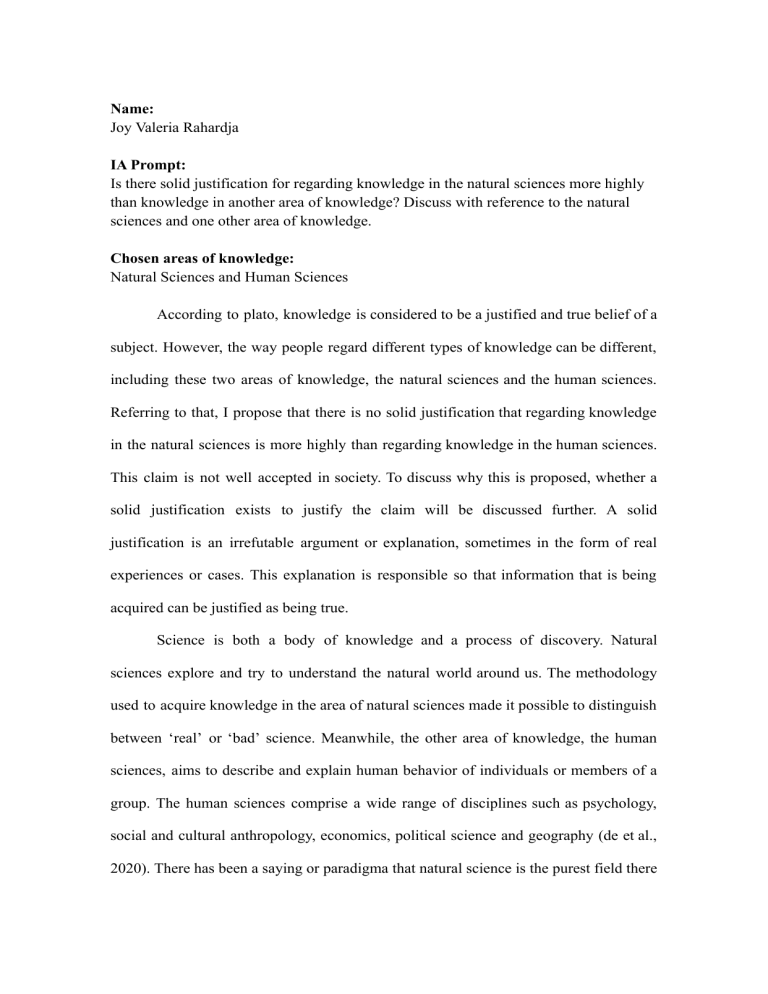
Name: Joy Valeria Rahardja IA Prompt: Is there solid justification for regarding knowledge in the natural sciences more highly than knowledge in another area of knowledge? Discuss with reference to the natural sciences and one other area of knowledge. Chosen areas of knowledge: Natural Sciences and Human Sciences According to plato, knowledge is considered to be a justified and true belief of a subject. However, the way people regard different types of knowledge can be different, including these two areas of knowledge, the natural sciences and the human sciences. Referring to that, I propose that there is no solid justification that regarding knowledge in the natural sciences is more highly than regarding knowledge in the human sciences. This claim is not well accepted in society. To discuss why this is proposed, whether a solid justification exists to justify the claim will be discussed further. A solid justification is an irrefutable argument or explanation, sometimes in the form of real experiences or cases. This explanation is responsible so that information that is being acquired can be justified as being true. Science is both a body of knowledge and a process of discovery. Natural sciences explore and try to understand the natural world around us. The methodology used to acquire knowledge in the area of natural sciences made it possible to distinguish between ‘real’ or ‘bad’ science. Meanwhile, the other area of knowledge, the human sciences, aims to describe and explain human behavior of individuals or members of a group. The human sciences comprise a wide range of disciplines such as psychology, social and cultural anthropology, economics, political science and geography (de et al., 2020). There has been a saying or paradigma that natural science is the purest field there is, thus, it is the most significant field there is. However, when ‘highly’ is defined as more significant and meaningful, then there is no solid justification that regarding knowledge in the natural sciences is more highly than that of human sciences. This is because natural sciences fail to measure or study certain things which are meaningful and crucial to human existence, fail to accept irregularities which are also true knowledge or phenomenon, as well as how knowledge in natural sciences cannot exist without an element of human science itself. Regarding knowledge in the natural sciences is not more significant than regarding knowledge in the human sciences. Certain areas are immeasurable by the natural sciences, and the value of these immeasurable areas are meaningful to humans themselves. One case which justifies this is the power of the placebo effect. Natural sciences cannot solely measure the mental processes which took place in the human’s mind as being stated by Thilly (1906). Normally, someone who feels mentally or physically ill would go to doctors or psychiatrists with hope that he or she will be given medications to result in a better condition. In some cases, the experts handling the case will give them pills containing no medicine or chemical at all, tricking them into believing that the pills can heal them. Harvard Health Publishing reveals that researchers then discover that these placebo pills are as effective as 50% (2021). Despite the improvements in scientific knowledge surrounding the placebo effect, efforts to characterize this phenomenon through the lens of natural science are still unsuccessful (Munnangi et al., 2022). However, this phenomenon can be analyzed and learned through the field of human sciences. Natural science cannot comprehend the power of the state of mental perception and the power of believing in a trickery or lie This being said, in some cases, knowledge in the field of natural sciences is not higher than human sciences, as certain areas which are important for humans are immeasurable in the natural sciences. Natural sciences cannot be deemed to be a knowledge regarded to be higher than human sciences due to its incapability of recognizing and understanding irregularity. Another example which proves the claim is a Harvard study on how to live longer and healthier lives. Harvard researchers conducted a study for almost 80 years. Biologically, living a longer and healthier life requires humans to have certain genes, diets, exercise periodically, sleep adequately, consume different kinds of vitamins, et cetera. All those patterns are required to live longer. However, their research produces an unexpected outcome. As it turns out, they conclude that the very one thing which could make an individual live longer and healthier is ‘relationships’ (Mineo, 2017). Again, the human sciences take account of the study of relationships better than natural sciences, as the natural sciences cannot explain the complex mechanisms of human interactions with other humans. This finding indicates that natural sciences cannot measure or study about human relationships with one another because everyone’s personality and perceptions will never be entirely similar to one another, thus, human interactions will be irregular to a certain extent and cannot be experimented through methods of natural sciences which always expect similar results to be deemed as ‘valid’. The process to obtain a conclusion in the natural sciences should always be based on similar patterns and the repetition of the same results. When one of the results or phenomenon is irregular, it is said to be ‘anomalous’ and unacceptable. This is the weakness of natural sciences, as humans’ lives in this world are filled with irregular phenomena which are also true, but they are refuted or denied by the natural sciences. The last reason why there is no solid justification regarding knowledge in the natural sciences more highly than that of human sciences is because the knowledge of the natural sciences itself cannot exist without an element of human science. Albert Einstein argues that there exists a passion for comprehension. Without this passion, there would be neither mathematics nor natural science. Passion itself is an element which is explorable in the field of human sciences, not natural science. An example to further explain this is the existence of the study of climate change. Climate change is indeed a natural science finding. Over the years, researchers have measured the increase in temperature and the rise of sea level using specific measurements. However, they will not have arrived at any findings if the researchers have no curiosity or motivation to study climate change, thus the knowledge in natural sciences will not exist without human science elements such as curiosity and motivation to obtain knowledge itself. Despite these arguments which state that regarding knowledge in natural sciences is not more highly than regarding knowledge in human sciences, there are still contradictory arguments which insist that regarding knowledge in natural sciences is higher. This is because natural sciences can measure more concrete and tangible things, unlike other areas of knowledge like the human sciences, thus the natural sciences is believed to be more of a ‘true knowledge’. An example of this contradictory argument is the Law of Gravitation by Isaac Newton. Natural science creates a way for humans to understand, using a precise measurement, why and how things fall into the surface of the earth. The tangibility of this phenomenon provides the perception that natural science, in this case through the field of physics, provides justified knowledge of the phenomenon we can see and touch with our own senses. In conclusion, there is no solid justification for regarding knowledge in the natural sciences more highly than knowledge in the human sciences. This is because, when applied to all cases, regarding knowledge in the natural sciences cannot measure the phenomena which human sciences can explore, it also cannot accept irregularities which in some cases are true, and that knowledge in the natural sciences cannot be produced without an element of human science itself (motivation to discover natural processes). Although this essay has provided its arguments to further justify its claim, it does not entirely diminish the possibility or perception that knowledge in the natural sciences is still more highly than that of the human sciences. Prussian-German philosopher, Karl Marx, once said that natural science will in time incorporate into itself the science of man, just as the science of man will incorporate into itself natural science: there will be one science. In the end, whether the society believes that the knowledge of natural sciences or human sciences is higher than the other, it is still important for the two to co-exist for the sake of knowledge discovery. References Admin. (2022, September 12). Gravitation - Newton's law of gravitation, gravitational force, solved examples. BYJUS. Retrieved November 18, 2022, from https://byjus.com/jee/gravitation/ de, L. R. van, Heydorn, W., & Jesudason, S. (2020). Theory of knowledge for the Ib diploma: Course guide. Cambridge University Press. Mineo, L. (2018, November 26). Over nearly 80 years, Harvard study has been showing how to live a healthy and happy life. Harvard Gazette. Retrieved November 18, 2022, from https://news.harvard.edu/gazette/story/2017/04/over-nearly-80-years-harvard-stud y-has-been-showing-how-to-live-a-healthy-and-happy-life/ The power of the placebo effect. Harvard Health. (2021, December 13). Retrieved November 18, 2022, from https://www.health.harvard.edu/mental-health/the-power-of-the-placebo-effect Thilly, F. (1906). Psychology, natural science, and philosophy. The Philosophical Review. Retrieved from http://www.jstor.org/stable/10.2307/2177732?refreqid=search-gateway.






